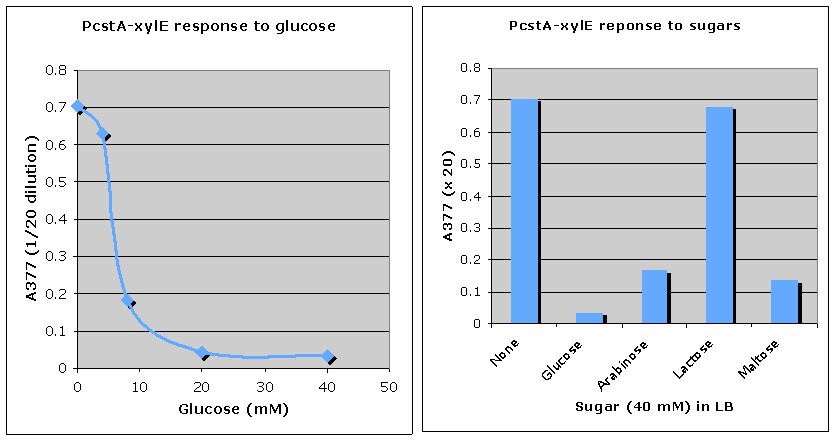Team:Edinbrugh/Results/PcstA-xylE
From 2008.igem.org
Contents |
PcstA Reporter Assay
Background and Aims
We have created a BioBrick of the cstA promoter (PcstA) as a possible promoter for our cellulase construct. According to the literature, PcstA is suppressed by high concentrations of glucose. We expect this property to be useful in our system as cellulolysis will be activated when the glucose supply is depleted.
This assay was designed to determine:
- Whether our PcstA BioBrick is functional.
- Whether our PcstA BioBrick is suppressed by high concentrations of glucose and other monosaccharide and disaccharide sugars.
Procedure
- xylE as reporter gene was added to the PcstA BioBrick. JM109 E. coli cells were transformed with this construct.
- Cells were grown overnight in LB containing:
- No added sugar,
- 5, 10, 20 or 40mM of glucose,
- or 40mM of either arabinose, lactose or maltose.
- Cells were resuspended in 50mM Tris buffer, pH 7.5, prior to assay to control for pH differences between the various cultures.
- Cells were developed with 0.5mM catechol for 5 minutes.
- The xylE gene product converts colourless catechol into a yellow oxidation product, which can be quantified by measuring absorbance at 375nm ([http://jb.asm.org/cgi/content/abstract/171/12/6617 Ingram et al.]). We measured absorbance at 377nm (A377).
Results
These results indicate that:
- Our PcstA BioBrick is functional. High quantities of the xylE gene product were generated in the absence of sugars.
- The promoter activity of PcstA is inversely proportional to the concentration of glucose. PcstA is extremely sensitive to glucose: there is a dramatic drop in promoter activity between glucose concentrations of 0mM and 10mM.
- PcstA is sensitive to glucose, arabinose and maltose. However, glucose suppresses PcstA most strongly and at the lowest concentrations.
 "
"

